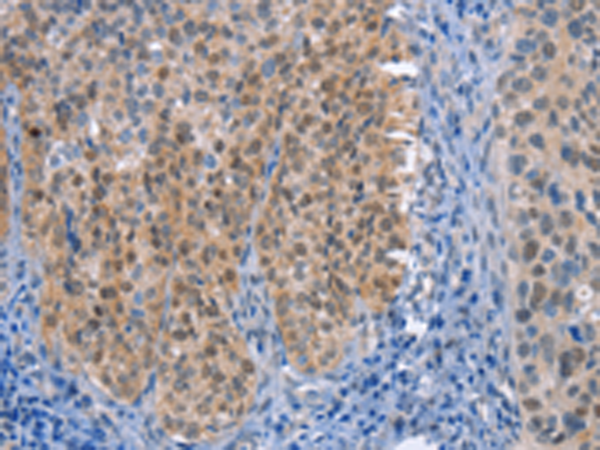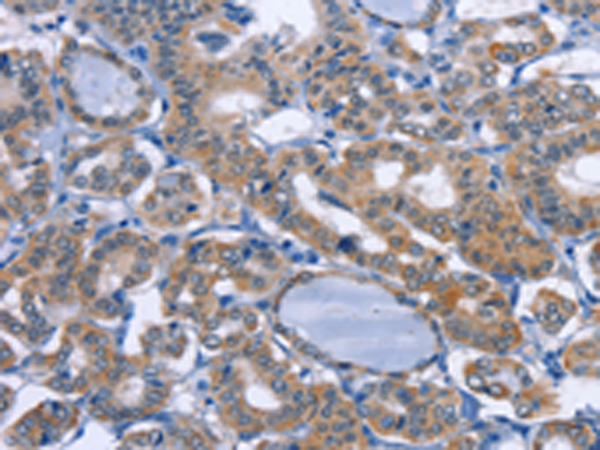

| WB | 咨询技术 | Human,Mouse,Rat |
| IF | 咨询技术 | Human,Mouse,Rat |
| IHC | 1/50-1/200 | Human,Mouse,Rat |
| ICC | 技术咨询 | Human,Mouse,Rat |
| FCM | 咨询技术 | Human,Mouse,Rat |
| Elisa | 1/1000-1/5000 | Human,Mouse,Rat |
| Aliases | URK1; RP11-334J6.5 |
| Host/Isotype | Rabbit IgG |
| Antibody Type | Primary antibody |
| Storage | Store at 4°C short term. Aliquot and store at -20°C long term. Avoid freeze/thaw cycles. |
| Species Reactivity | Human |
| Immunogen | Fusion protein of human UCK1 |
| Formulation | Purified antibody in PBS with 0.05% sodium azide and 50% glycerol. |
+ +
以下是关于UCK1抗体的3篇参考文献的简要信息:
1. **"Uridine-cytidine kinase 1 promotes hepatocellular carcinoma progression through c-Myc stabilization"**
*作者:Zhang Y, et al.*
摘要:研究通过UCK1抗体检测发现,UCK1在肝癌组织中高表达,通过稳定c-Myc蛋白促进肿瘤增殖和转移,提示其作为肝癌治疗潜在靶点。
2. **"UCK1-dependent pyrimidine nucleotide synthesis regulates glioblastoma growth and chemoresistance"**
*作者:Li H, et al.*
摘要:利用UCK1抗体进行免疫印迹分析,发现胶质母细胞瘤中UCK1通过调控嘧啶核苷酸合成增强肿瘤对替莫唑胺的耐药性,抑制UCK1可逆转耐药表型。
3. **"A functional genomics approach identifies UCK1 as a determinant of 5-fluorouracil sensitivity in colon cancer"**
*作者:Wang X, et al.*
摘要:通过UCK1抗体的免疫组化实验,揭示结肠癌中UCK1表达水平与5-FU化疗敏感性负相关,其过表达导致核苷酸代谢失衡并降低药物疗效。
The UCK1 (uridine-cytidine kinase 1) antibody is a tool used to study the UCK1 enzyme, a key player in the pyrimidine salvage pathway. UCK1 catalyzes the phosphorylation of uridine and cytidine to their monophosphate forms (UMP/CMP), a critical step in RNA synthesis and cellular proliferation. This 22-24 kDa protein, encoded by the *UCK1* gene in humans, is primarily expressed in the liver, kidney, and certain cancer cells.
Research on UCK1 has gained attention due to its role in activating prodrugs like 5-fluorouridine (5-FU) in chemotherapy, linking it to cancer treatment efficacy. Overexpression of UCK1 has been observed in hepatocellular carcinoma and colorectal cancer, suggesting its potential as a therapeutic target or biomarker.
UCK1 antibodies are widely used in techniques such as Western blotting, immunohistochemistry (IHC), and immunofluorescence (IF) to detect UCK1 expression levels, subcellular localization, and interactions in disease models. They help elucidate UCK1's regulatory mechanisms, including post-translational modifications and its interplay with signaling pathways like mTOR. Specificity validation via knockout controls is essential due to structural similarities with UCK2. a paralog with overlapping functions.
Overall, UCK1 antibodies serve as vital reagents in exploring nucleotide metabolism dysregulation, cancer biology, and drug development strategies.
×